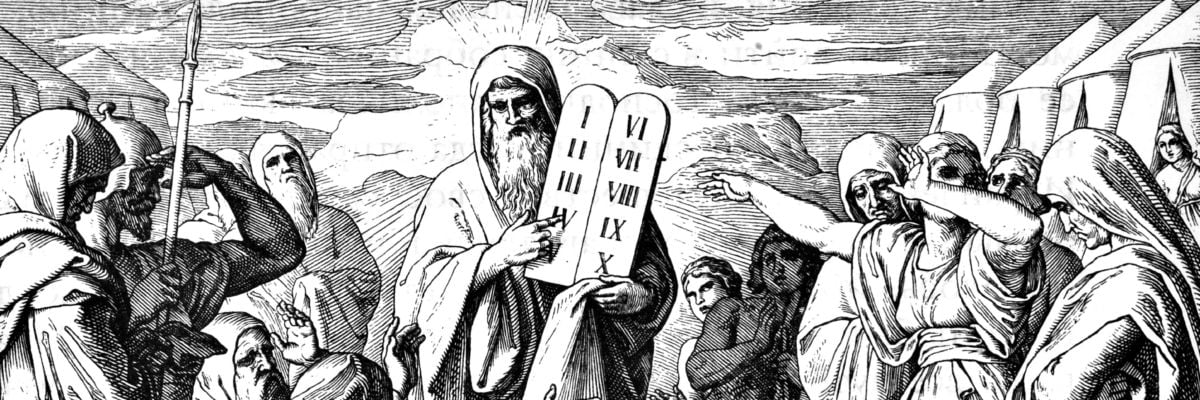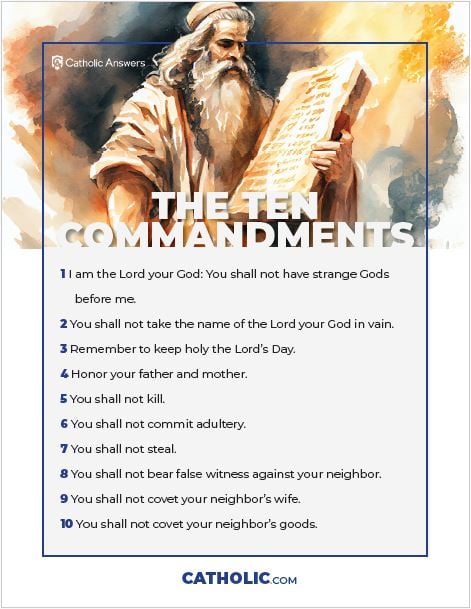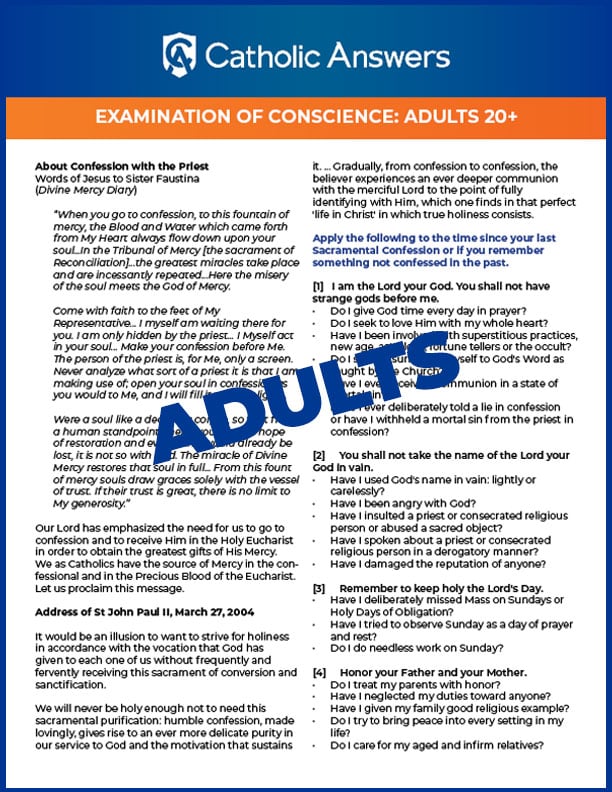
What Are the 10 Commandments?
The Ten Commandments are a set of laws God gave to Moses on Mount Sinai to guide the life of his chosen people, the Israelites, after he delivered them from slavery in the land of Egypt. These commandments, also known as the Ten Commandments of God, form the foundation of moral life for many people in the world, especially Jews and Christians. Catholics ask, “What are the 10 Commandments?” and “Where are the 10 Commandments found in the Bible?” The answer to both questions is clearly found in Exodus 20 and Deuteronomy 5. The commandments are God’s revealed will for every human being, all who are made in his image and likeness (Gen. 1:26-27), teaching us all how to love him and our neighbor rightly.
Where Are the 10 Commandments in the Bible?
The 10 Commandments in the Bible prominently appear twice: first in Exodus 20:1-17, and again in Deuteronomy 5:4-21. In these passages, God declares, “I am the Lord your God,” reminding his people of his identity as the one who liberated them from Egyptian bondage. The Lord then commands his people to live holy lives by following his laws. The earth beneath Mount Sinai trembled as God spoke these laws, showing their seriousness and importance (Exod. 20:18-20).
What Are the 10 Commandments in Order?
Catholics follow a traditional order, largely influenced by St. Augustine’s teachings:
-
I am the Lord your God; you shall have no other gods before me.
-
You shall not take the name of the Lord your God in vain.
-
Remember the sabbath day, to keep it holy.
-
Honor your father and your mother.
-
You shall not kill.
-
You shall not commit adultery.
-
You shall not steal.
-
You shall not bear false witness against your neighbor.
-
You shall not covet your neighbor’s wife.
-
You shall not covet your neighbor’s goods.
Free Download | The Ten Commandments
Why Are the 10 Commandments Important?
The commandments are not merely rules, a list of dos and don’ts. They are the foundation to living in right relationship with God and others, so that we might one day attain eternal life heaven with Jesus (Matt. 19:16-26). For example, the phrase “days you shall labor” refers to the six days of work before resting on the Sabbath, which in the Old Covenant was from sundown Friday to sundown Saturday (see Lev. 23:32). The law commands a balance between work and worship, emphasizing rest as a sacred gift.
In addition, the commandments cover not only our external actions but also our internal dispositions. Clear examples are the prohibitions against coveting, which address the desires of the heart that can lead to sin even if outward acts are avoided (see Matt. 5:8, 27-28).
So, who wrote the 10 Commandments? As Scripture affirms, God himself inscribed these laws on stone tablets, which he gave to Moses to teach the Israelites (Exod. 31:18; Deut. 4:12-14). Indeed, man did not make these commandments; rather, they are divine instructions to guide us in living our lives in right relationship with the Lord.
What Are the 10 Commandments in Simple Terms?
In simple terms, the Ten Commandments teach us:
- To love God above all things (no other gods, inclusive of idolatrous graven images), honor his name, and keep holy the Sabbath, which in the New Covenant is fulfilled in our observance of the Lord’s Day (Sunday).
- To love others as ourselves (honor parents, respect life, fidelity in marriage, honesty, and avoid sinful desires).
Jesus himself says he did not come to abolish the law but to fulfill it (Matt. 5:17-18), thus confirming the ongoing relevance of the commandments for our life as his Christian disciples.
Did the Catholic Church Change the 10 Commandments?
Some claim that the Catholic Church changed the 10 Commandments. In fact, the Church has not changed God’s moral law, but rather follows an ancient tradition of numbering that differs slightly from some Protestant and Jewish lists of the commandments.
In his original revelation to Moses, which the Bible records in Exodus 20, God did not number the Ten Commandments. However, as indicated above, the commandment, “You shall have no gods before me” encompasses the prohibition against making graven images for the purpose of bowing down to (worshiping) and otherwise serving them as idols. Such worship and service is a form of idolatry, an example of putting a false god ahead of the one, true God, which the first commandment prohibits (Exod. 20:3; Deut. 20:7). In addition, idolatry differs markedly from the veneration of sacred images. As noted in this Q&A, “Catholics don’t pray to images; they pray through them to the holy persons who are depicted. . . . In other words, these images are instruments of prayer, not objects of prayer in the strict sense” (emphasis original).
So the Catholic Church’s numbering logically combines these related prohibitions into a single first commandment. Similarly, Catholics do not arbitrarily divide what others list as the singular last commandment of the Decalogue. Rather, God’s teaching against coveting has two distinct parts, as expressed in Deuteronomy 5:21—one forbidding coveting a neighbor’s wife, as Tim Staples makes clear in this article, and the other forbidding coveting a neighbor’s goods.
While the Church’s numbering may differ from the lists of other Christians and the Jewish people, it is the Catholic Church alone, as the restored and fulfilled New Covenant kingdom of Israel, which Jesus empowers to teach and safeguard his saving doctrine. In addition, though differing in numbering the commandments, these respective lists contain all of the same doctrinal content of the Ten Commandments, in conformity with Sacred Scripture.
How Many Commandments Are There?
There are ten commandments. This number symbolizes completeness and is affirmed in Scripture passages, specifically Exodus 34:28 and Deuteronomy 4:13.
Did the Catholic Church Change the Sabbath to Sunday?
In more recent centuries, a small number of Christians have argued that Jesus never changed the Sabbath day, and so the Catholic Church had no right to do so. This contention ignores that the Lord’s Day (Rev. 1:10), i.e., the day on which Jesus rose from the dead (Sunday) fulfills the Old Covenant Sabbath (see CCC 2175-2176). Indeed, the apostles and others disciples gathered on “the first day of the week” to celebrate the breaking of the bread or Eucharist (Acts 20:7-12), which is the sacramental making present and offering anew of Christ’s one sacrifice of Calvary (see 1 Cor. 10:14-22). And it is principally on the Lord’s Day that we partake of the ”Lord’s Supper” (1 Cor. 11:17-32, emphasis added). The early Church affirms that “the breaking of the bread” on the Lord’s Day was a fundamental precept of Christian life (Acts 2:42), and Scripture records that Jesus himself celebrates “the breaking of the bread” on that first Easter Sunday (Luke 24:30-31, 35).
See also Tim Staples’ article on how “The Lord’s Day Replaced the Sabbath.”
How Should Catholics Live the 10 Commandments Today?
Catholics should understand the commandments as a guide to living holy lives by loving God and their neighbor, as Jesus affirms before proclaiming the parable of the Good Samaritan (Luke 10:25-28). The Catechism of the Catholic Church (CCC) elaborates on each commandment, explaining its meaning in the light of Jesus’ teaching, including through the Sacred Tradition he has imparted to his Church (see John 16:13; CCC 2052-2557).
Catholics are encouraged to follow the commandments not simply out of obligation, but primarily out of love for God and neighbor. Embracing the commandments also prepares us to receive God’s grace in the sacraments, especially Holy Communion (the Eucharist) on the Lord’s Day, and to live in harmony with the mystical body of Christ and our neighbor in general.
The 10 Commandments and the Examination of Conscience
The Ten Commandments provide a crucial guide for the examination of conscience, a prayerful reflection which Catholics ought to perform regularly, especially before receiving the sacrament of reconciliation (confession). By reviewing each commandment, individuals honestly assess their thoughts, words, and deeds to see where they have fallen short of living God’s liberating laws, because, as Jesus reminds us,
“…and the truth will make you free.” (John 8:32)
For example, reflecting on “Thou shalt not commit adultery” helps a person examine his faithfulness in his various relationships, while “You shall not bear false witness” calls attention to our honesty in daily life. The commandment to “Remember the sabbath day to keep it holy” invites reflection on how well we prepare for and participate in Sunday Mass and sacred rest on the Lord’s Day, the New Covenant fulfillment of the Sabbath observance.
The examination of conscience helps Catholics grow in self-awareness, repent of sins, and renew our commitment to live according to God’s will, as revealed in the Ten Commandments.
Download our Free PDF Download | Examination of Conscience for Adults
Frequently Asked Questions
- What is the first commandment?
The first commandment is: “I am the Lord your God; you shall not have strange gods before me.” - Where are the 10 Commandments in the Bible?
The commandments are found in Exodus 20 and Deuteronomy 5. - Who wrote the 10 Commandments?
God wrote the commandments and gave them to Moses on Mount Sinai. - What are the 10 Commandments in simple terms?
They teach us to love God and neighbor by avoiding idolatry, dishonor, and sin in thoughts, words, and actions. - Are the 10 Commandments still relevant today?
Yes. They remain the foundation of Christian moral teaching.
Living Out the Ten Commandments
The Ten Commandments are God’s loving gift, directing us toward a life of holiness. They reveal how to worship God as the one true “Lord your God” (Exod. 20:2, 5, 7, 10, 12), respect the sacredness of life and family, and live honestly and justly with others. Whether it’s resting on the blessed Lord’s Day, avoiding the sin of coveting your neighbor, or honoring your parents, the Ten Commandments set the God-given standards of right and wrong to which all people are accountable.
As Catholics, we continue to live these commandments, following Christ’s fulfillment of the law and embracing the grace that helps us submit to his divine will.
Related Content
Podcasts
Forbidden Statues in the Commandments
Hiding the Commandment Against Idolatry?
Articles
Did the Catholic Church Change the Ten Commandments?
How to Split the Ten Commandments
The Catholic Answers Guide to an Examination of Conscience
Q & A
Displaying the Ten Commandments
St. Augustine and the Ten Commandments
Did Jesus Alter the Commandment About Observing the Sabbath?
Books
The New Relativism: Unmasking the Philosophy of Today’s Woke Moralists
Real Religion: How to Avoid False Faith and Worship God in Spirit and Truth




